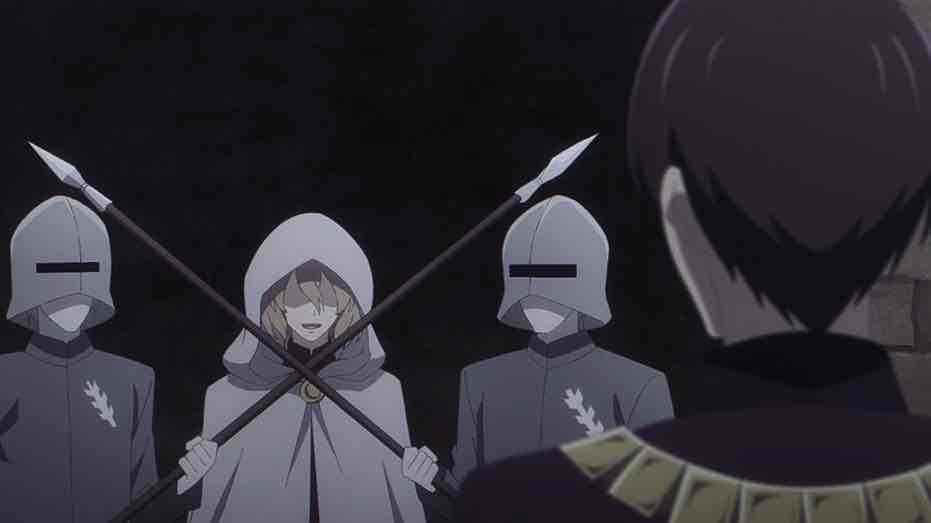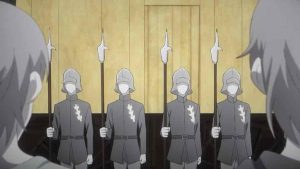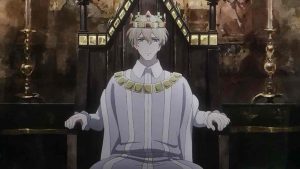 I want to ding Baraou no Souretsu for being too much of a soap opera. But then I stop and think about actual English history – or at least what the recorded version tells us. There’s a reason everyone from Shakespeare to George R.R. Martin took inspiration from these people in this era – there was a “stranger than fiction” quality to all of it. If anything ever lent itself to an overdramatic reimagining it’s The War of the Roses, because you could put the real events in a treatment and Hollywood would reject it for being unrealistic.
I want to ding Baraou no Souretsu for being too much of a soap opera. But then I stop and think about actual English history – or at least what the recorded version tells us. There’s a reason everyone from Shakespeare to George R.R. Martin took inspiration from these people in this era – there was a “stranger than fiction” quality to all of it. If anything ever lent itself to an overdramatic reimagining it’s The War of the Roses, because you could put the real events in a treatment and Hollywood would reject it for being unrealistic.
 I think the key to enjoying this series is to just give up and let the loopyness wash over you. I mean, I’d certainly like to know why every able-bodied character with a penis seems to fall head-over-heels for Richard (except Warwick, but I think only power gets him to salute). But that’s just the way it is, so be Taoist and go with the current – there’s no place for salmon with Requiem of the Rose King. And frankly seeing Richard deal with all this interest while trying to maintain his dignity and self-identity is consistently entertaining.
I think the key to enjoying this series is to just give up and let the loopyness wash over you. I mean, I’d certainly like to know why every able-bodied character with a penis seems to fall head-over-heels for Richard (except Warwick, but I think only power gets him to salute). But that’s just the way it is, so be Taoist and go with the current – there’s no place for salmon with Requiem of the Rose King. And frankly seeing Richard deal with all this interest while trying to maintain his dignity and self-identity is consistently entertaining.
 It’s Edward Lancaster than provides Richard’s path to shaping events here – or more specifically, his libido. Warwick is going that extra mile to humiliate Edward (York), even bringing him the head of his father-in-law (his treacherous wife has gotten thee to a nunnery). Richard and Catesby have no means to rescue the king even knowing where he is, but a chance meeting with Edward (Lancaster) gives them that means. In addition to the fact that he’d do anything to make Richard his woman, Edward of Westminster is growing increasingly skeptical of Warwick’s intentions (and with good reason).
It’s Edward Lancaster than provides Richard’s path to shaping events here – or more specifically, his libido. Warwick is going that extra mile to humiliate Edward (York), even bringing him the head of his father-in-law (his treacherous wife has gotten thee to a nunnery). Richard and Catesby have no means to rescue the king even knowing where he is, but a chance meeting with Edward (Lancaster) gives them that means. In addition to the fact that he’d do anything to make Richard his woman, Edward of Westminster is growing increasingly skeptical of Warwick’s intentions (and with good reason).
 I’m not sure who’s the more pitiably absurd afterthought, Edward Lancaster or George, but it’s clear that both are nothing more than tools being wielded by smarter players. Richard’s plan is to have Edward L. smuggle him into Warwick’s castle as a “high-class prostitute” for Edward Y’s entertainment, and their journey to that point is a chronicle of Edward L’s pathetic attempts to prove his masculinity to Richard and win his heart. Richard is happy enough to play along as he needs little Edward’s help, but it should be notice that he doesn’t betray him when he accomplishes his mission – he offers Edward Lancaster the chance to join Edward York in alliance against Warwick, but the former declines.
I’m not sure who’s the more pitiably absurd afterthought, Edward Lancaster or George, but it’s clear that both are nothing more than tools being wielded by smarter players. Richard’s plan is to have Edward L. smuggle him into Warwick’s castle as a “high-class prostitute” for Edward Y’s entertainment, and their journey to that point is a chronicle of Edward L’s pathetic attempts to prove his masculinity to Richard and win his heart. Richard is happy enough to play along as he needs little Edward’s help, but it should be notice that he doesn’t betray him when he accomplishes his mission – he offers Edward Lancaster the chance to join Edward York in alliance against Warwick, but the former declines.
 For Warwick, King Edward’s escape – and George’s response – are enough to convince him that George doesn’t have the spine to be king. And that’s saying something, since Warwick’s preferred candidate will always be spineless enough to be controllable. Warwick shifts his allegiance yet again, throwing George over the side and pivoting to Edward of Westminster – and by extension his father, Henry. Meanwhile the clever little Duke of Buckingham has predicted Richard’s move and acted to shield and aid him in his escape. He’d prefer Richard kill his eldest brother now, but Richard will have none of that, and a war to restore Edward of York will at least improve Richard’s reputation.
For Warwick, King Edward’s escape – and George’s response – are enough to convince him that George doesn’t have the spine to be king. And that’s saying something, since Warwick’s preferred candidate will always be spineless enough to be controllable. Warwick shifts his allegiance yet again, throwing George over the side and pivoting to Edward of Westminster – and by extension his father, Henry. Meanwhile the clever little Duke of Buckingham has predicted Richard’s move and acted to shield and aid him in his escape. He’d prefer Richard kill his eldest brother now, but Richard will have none of that, and a war to restore Edward of York will at least improve Richard’s reputation.
 On the romance front, Warwick rips the monarchy out of Isabelle’s greedy clutches by dumping George, and promises Anne to Edward Lancaster, thus making her the future queen. So, amusingly, we have two people about to be forced to marry who’re both in love with the same person. And as it’s happening the man being restored to the throne is also in love with him. The real prize here is not the throne, seemingly, but Richard’s virtue – though if Edward L. knew what his father and Richard had gotten up to, his perspective would no doubt be a little different…
On the romance front, Warwick rips the monarchy out of Isabelle’s greedy clutches by dumping George, and promises Anne to Edward Lancaster, thus making her the future queen. So, amusingly, we have two people about to be forced to marry who’re both in love with the same person. And as it’s happening the man being restored to the throne is also in love with him. The real prize here is not the throne, seemingly, but Richard’s virtue – though if Edward L. knew what his father and Richard had gotten up to, his perspective would no doubt be a little different…












































Collectr
February 22, 2022 at 6:39 amYeah, the coincidences and lust-for-Richard are out-of-hand. Edward Lancaster thinks Richard is a woman, having copped a feel of Richard’s upper body in an earlier episode. But would Richard fail to recognize someone who has such recognizable Plantagenet features? Or Edward of York, for that matter? The whole episode is improbable and unhistorical – Edward was actually released by Warwick and resumed the throne; Warwick and George’s alliance with Margaret of Anjou occurred later.
The show is already setting Buckingham up as Richard’s tempter and evil genius – a role he played in Paul Murray Kendall’s biography of Richard III as well. There has to be the villain in the piece, and if you don’t agree with Shakespeare that it’s Richard, then it must be someone else.